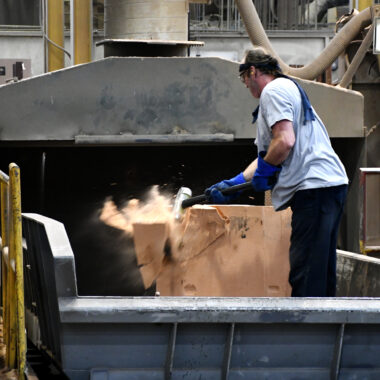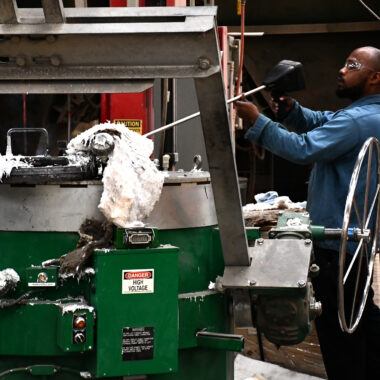Dive Deep: Insights About Aluminum Casting Processes
Wiki Article
Crafting Perfection: Exactly How to Accomplish High-Quality Light Weight Aluminum Castings Each Time
In the realm of light weight aluminum spreading, the pursuit of excellence is a continual trip that requires a thorough technique and a keen understanding of the complexities involved. Attaining consistent high-grade aluminum castings requires an extensive understanding of the processes, from choosing the appropriate alloy to implementing accurate mold and mildew layouts and meticulously controlling casting parameters. Nonetheless, truth mastery lies in the capability to implement these elements flawlessly to produce flawless spreadings every time. As we discover the complexities of crafting perfection in light weight aluminum castings, discovering the vital methods and strategies that result in impressive results comes to be vital for those pursuing quality in this specific area.Understanding Aluminum Spreading Processes
Aluminum casting processes, necessary in the manufacturing market, entail the complex improvement of liquified light weight aluminum right into solid forms with a series of meticulously controlled actions. Comprehending these procedures is extremely important to accomplishing top notch light weight aluminum castings regularly - about aluminum casting. The main approaches utilized in aluminum casting are die casting, sand spreading, and investment spreading
Each of these processes has its advantages and is chosen based on factors like intricacy, volume, and desired surface of the aluminum spreading. about aluminum casting. Recognizing the ins and outs of these approaches is vital for manufacturers aiming to generate top quality aluminum castings regularly
Choosing the Right Aluminum Alloy
Picking the ideal aluminum alloy is a crucial choice in the manufacturing of top quality aluminum spreadings. The option of alloy substantially impacts the buildings and attributes of the end product. Different aluminum alloys use varying degrees of toughness, deterioration resistance, machinability, and thermal conductivity. When picking an aluminum alloy for casting, it is important to take into consideration the certain needs of the application to ensure optimum efficiency.One of the most generally utilized light weight aluminum alloys for spreading is A356 - about aluminum casting. For applications requiring high strength, 7075 aluminum alloy is a popular option due to its remarkable strength-to-weight proportion.
Along with mechanical properties, considerations such as cost, availability, and post-casting processes ought to additionally influence the option of the ideal light weight aluminum alloy. By very carefully reviewing these factors, makers can make certain the manufacturing of top notch light weight aluminum castings that meet the desired specifications.
Executing Correct Mold And Mildew Style
Establishing a reliable mold design is critical for guaranteeing the successful production of high-quality aluminum spreadings. Correct mold design plays a considerable role in achieving the preferred attributes of the last item. To implement a successful mold and mildew style, factors such as product flow, cooling down prices, and part geometry should be thoroughly considered.One trick element of mold design is ensuring proper dental filling and solidification of the aluminum within the mold dental caries. This involves designing runner and gating systems that facilitate smooth metal flow and stop problems such as air entrapment or incomplete filling. In addition, integrating air conditioning channels right into the mold layout assists manage solidification rates and decrease the threat of porosity or shrinkage defects.

Controlling Spreading Parameters

Ensuring Post-Casting High Quality Checks
To preserve the top quality of light weight aluminum castings, complete post-casting high quality checks are vital. After the casting procedure is completed, it is essential to make sure why not try here that the end products fulfill the preferred specs and standards. Among the key quality checks includes evaluating the surface coating of the castings to identify any type of issues such as porosity, fractures, or surface irregularities. This aesthetic inspection is commonly supplemented by non-destructive screening techniques like ultrasonic testing or dye penetrant assessment to spot internal problems that might endanger the honesty of the spreading.Dimensional accuracy is one more crucial facet that should be confirmed throughout post-casting high quality checks. Dimensions of crucial dimensions and tolerances ought to be required to verify that the castings comply with the required specs. In addition, mechanical see this page homes such as solidity, tensile toughness, and impact resistance might require to be reviewed with product screening to make certain that the spreadings possess the needed toughness and toughness for their designated application.
Conclusion
Finally, accomplishing high-quality light weight aluminum spreadings calls for an extensive understanding of the casting processes, picking the appropriate alloy, making mold and mildews effectively, managing casting specifications thoroughly, and performing post-casting quality checks diligently. By following these actions, makers can consistently create aluminum castings that satisfy the highest possible criteria of top quality and performance.Achieving constant premium light weight aluminum spreadings demands an extensive understanding of the procedures, from selecting the ideal alloy to carrying out specific mold and mildew layouts and thoroughly controlling spreading parameters. The main approaches utilized in aluminum spreading are die spreading, sand casting, and financial investment spreading.
Financial investment casting, likewise understood as precision casting, includes producing wax patterns that are coated in ceramic to develop molds.Selecting the ideal aluminum alloy is a critical decision in the manufacturing of high-quality light weight aluminum spreadings.Guaranteeing exact control over casting criteria is crucial for maintaining uniformity and quality in light weight aluminum spreading production.
Report this wiki page